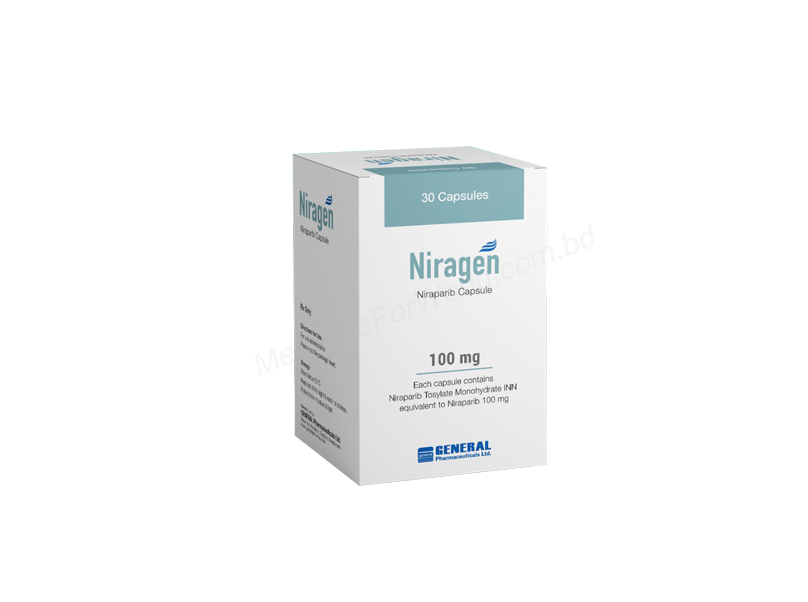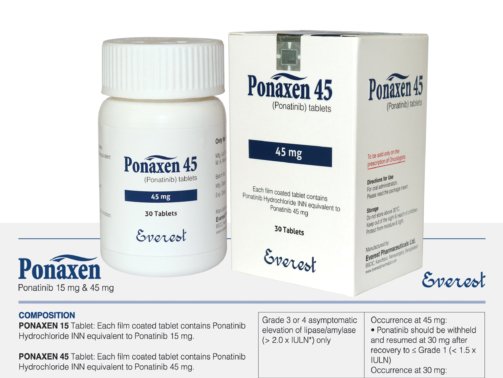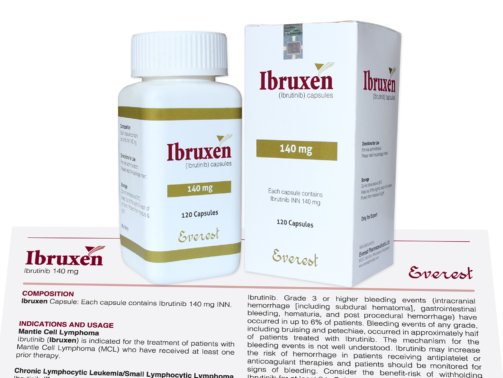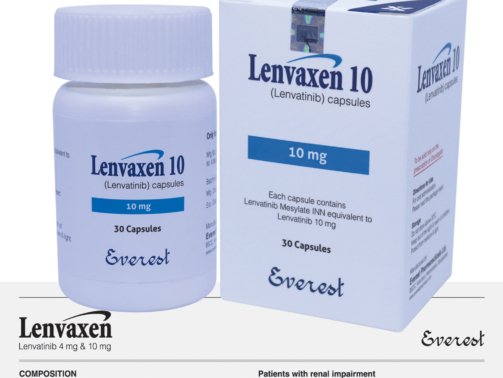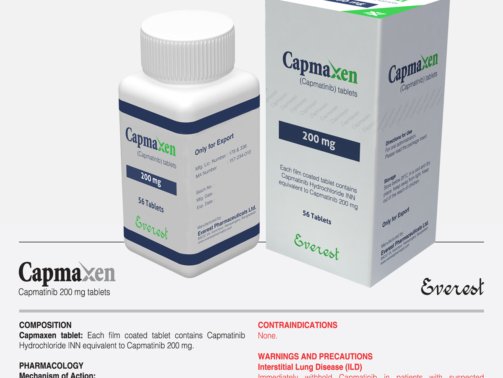Niraparib 100 mg (Zejula)
0.00$
Niragen is a capsule medication comprising 100mg of Niraparib. Niraparib, categorized as a poly(ADP-ribose) polymerase (PARP) inhibitor, is utilized in oncology to treat specific cancers like ovarian cancer, fallopian tube cancer, and primary peritoneal cancer. This class of drugs, including Niraparib, functions by interrupting DNA repair processes within cancer cells, ultimately resulting in their demise.
Niraparib, marketed under the brand name Zejula, is an oral, once-daily medication used primarily in the treatment of certain types of cancers. It is classified as a poly (ADP-ribose) polymerase (PARP) inhibitor and is particularly effective in the management of ovarian, fallopian tube, and primary peritoneal cancers. Zejula is available in 100 mg capsules and is prescribed under the supervision of a qualified oncologist.
Mechanism of Action
Inhibiting the activity of PARP enzymes, which are essential for DNA repair, is how niraparib functions. Cancer cells, especially those with BRCA1 or BRCA2 mutations or with homologous recombination deficiency (HRD), are particularly reliant on PARP-mediated repair pathways to fix DNA damage and continue proliferating. By blocking PARP, Niraparib causes DNA damage to accumulate in these cancer cells, ultimately leading to cell death. This selective process offers a tailored approach to cancer therapy while sparing normal cells to a higher degree.
Clinical Indications
The U.S. Food and Drug Administration (FDA) has approved Zejula for a number of uses, including:
Maintenance therapy for adult patients who are either fully or partially responding to platinum-based chemotherapy for primary peritoneal cancer, fallopian tube cancer, or recurrent epithelial ovarian cancer.
Regardless of whether they have a BRCA mutation or not, patients with advanced ovarian cancer who have responded to first-line platinum-based chemotherapy should get first-line maintenance therapy.
treatment of advanced ovarian cancer in patients who have received three or more previous chemotherapy treatments and have HRD-positive tumors, including BRCA mutations.
Zejula is a flexible alternative for the treatment of ovarian cancer because of its increased indication for usage independent of BRCA status.
Dosage and Administration
There are hard pills with 100 mg of niraparib. Weight and platelet count are two patient-specific characteristics that affect the suggested starting dose:
For those who weigh more than 77 kg and have baseline platelets of at least 150,000/μL, 300 mg once daily (three 100 mg capsules) is recommended.
Those who weigh less than 77 kg or have platelets that are less than 150,000/μL should take 200 mg once daily (two 100 mg capsules).
It can be taken with or without food and should be taken once daily, ideally at the same time every day. Depending on a person’s tolerance and the development of adverse effects, dose modifications might be required.
Side Effects and Safety Profile
Niraparib 100 mg (Zejula) has some adverse effects, just like any other cancer treatment. Among the most frequent negative consequences are:
Hematological: neutropenia (low white blood cell count), anemia, and thrombocytopenia (low platelet count).
Gastrointestinal: reduced appetite, diarrhea, constipation, vomiting, and nausea.
General: headache, dizziness, fatigue, and sleeplessness.
Cardiovascular: One significant adverse effect that may need to be watched over and managed is hypertension.
Although less often, serious side effects could include:
Acute myeloid leukemia (AML) and myelodysplastic syndrome (MDS) are uncommon but potentially fatal hematological conditions.
Monitoring for severe bone marrow suppression requires routine complete blood counts (CBCs).
A rare neurologic condition known as posterior reversible encephalopathy syndrome (PRES) needs to be stopped right away if it is suspected.
Drug Interactions and Precautions
In comparison to other chemotherapeutic drugs, niraparib has a comparatively low risk of drug-drug interactions. To prevent negative interactions, patients should disclose all medications and supplements they are taking to their healthcare provider.
Patients with severe hepatic or renal impairment or those with previous hematologic problems should be treated with extra caution. Because of the possible risks to the fetus or baby, the medication is not advised for use during pregnancy or lactation.
Storage and Handling
Zejula capsules have to be kept out of direct sunlight and at room temperature. Keep them out of children’s reach and in their original container. Patients should be cautioned not to fracture or break the capsules.
Points for Patient Counseling Patients should be properly educated about the possible adverse effects, the significance of taking Niraparib as prescribed, and the need for frequent follow-up appointments and blood tests before starting the medication. Patients should be urged to report any persistent lethargy, infection symptoms, or unusual bleeding.
Conclusion
An important development in targeted cancer treatment is niraparib 100 mg (Zejula), especially for women with advanced or recurring ovarian tumors. Its method of specifically preventing cancer cells from repairing their DNA provides a potential treatment approach that increases many patients’ progression-free survival. Zejula is a crucial part of the oncologist’s toolbox since, despite the possibility of side effects, risks are reduced by thorough monitoring and customized dosage.
Order Now At Mdx Pharma bd….
To order from MDX Pharma BD, visit their website at https://mdxpharmabd.com, where you can browse products and place orders online. For inquiries or orders via email, contact emedicarepharma@gmail.com. Alternatively, call (+88) 01929123476. Their address is 29, Abdullahpur, Uttara, Dhaka-1230, Bangladesh.
1. What is the purpose of Niraparib (Zejula)?
Some types of primary ovarian, fallopian tube, or peritoneal cancer are treated with niraparib. It is typically used as a maintenance treatment after platinum-based chemotherapy has shown an acceptable response.
2. How is Niraparib administered?
Niraparib is an inhibitor of PARP. It causes cancer cell death by inhibiting enzymes that help cancer cells repair damaged DNA, particularly in tumors with faulty DNA repair systems (e.g., BRCA mutations).
3. How does one take Niraparib?
The oral medication niraparib is typically used once a day, with or without food. Depending on the patient’s body weight and platelet count, the initial dosage is often 200–300 mg per day, which can be split into 1–3 capsules of 100 mg each.
4. Can patients who test negative for BRCA use Niraparib?
Regardless of whether a patient has a BRCA mutation or not, niraparib can be beneficial; however, patients who are homologous recombination-deficient (HRD) or BRCA-positive may see a greater response.
5. How long is a patient allowed to take Niraparib?
In most cases, patients stay on medication until the condition worsens or the toxicity becomes intolerable. If they tolerate therapy well, some people stay on it for months or even years.
| Generic Name | Niraparib |
|---|---|
| Formulation | Capsule |
| Available Pack Size | 30's |
| Available Strength | 100mg |

 Cart is empty
Cart is empty 